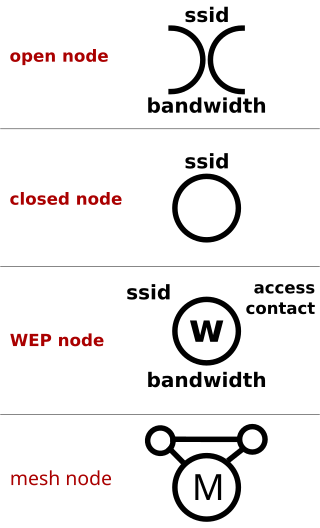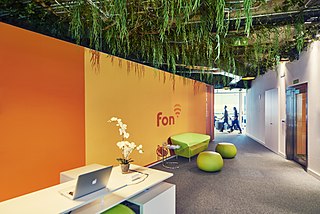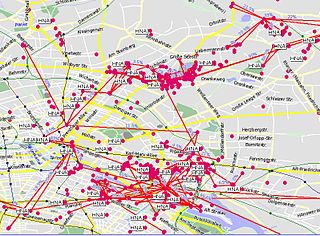
The Personal Telco Project is a wireless community network project in Portland, Oregon. It was founded by Adam Shand in November 2000 after he read a Slashdot article about the Consume The Net project in London.

Wireless community networks or wireless community projects or simply community networks, are non-centralized, self-managed and collaborative networks organized in a grassroots fashion by communities, non-governmental organizations and cooperatives in order to provide a viable alternative to municipal wireless networks for consumers.

Warchalking is the drawing of symbols in public places to advertise an open Wi-Fi network. Inspired by hobo symbols, the warchalking marks were conceived by a group of friends in June 2002 and publicised by Matt Jones who designed the set of icons and produced a downloadable document containing them. Within days of Jones publishing a blog entry about warchalking, articles appeared in dozens of publications and stories appeared on several major television news programs around the world.

Wi-Fi is a family of wireless network protocols based on the IEEE 802.11 family of standards, which are commonly used for local area networking of devices and Internet access, allowing nearby digital devices to exchange data by radio waves. These are the most widely used computer networks, used globally in home and small office networks to link devices and to provide Internet access with wireless routers and wireless access points in public places such as coffee shops, hotels, libraries, and airports to provide visitors.

In computer networking, a wireless access point, or more generally just access point (AP), is a networking hardware device that allows other Wi-Fi devices to connect to a wired network or wireless network. As a standalone device, the AP may have a wired connection to a router, but, in a wireless router, it can also be an integral component of the router itself. An AP is differentiated from a hotspot, which is a physical location where Wi-Fi access is available.

Wardriving is the act of searching for Wi-Fi wireless networks, usually from a moving vehicle, using a laptop or smartphone. Software for wardriving is freely available on the internet.

NetZero is an Internet service provider based in Woodland Hills, Los Angeles, California. It is a subsidiary of United Online, which in turn is a subsidiary of investment bank B. Riley Financial. United Online is also the parent of Juno Online Services and BlueLight Internet Services.

A hotspot is a physical location where people can obtain Internet access, typically using Wi-Fi technology, via a wireless local-area network (WLAN) using a router connected to an Internet service provider.

Fon Wireless Ltd. is a for-profit company incorporated and registered in the United Kingdom that provides wireless services. Fon was founded in Madrid, Spain, in 2006, by Martín Varsavsky where it headquarters most of its operations.

Freifunk is a non-commercial open grassroots initiative to support free computer networks in the German region. Freifunk is part of the international movement for a wireless community network. The initiative counts about 400 local communities with over 41,000 access points. Among them, Münster, Aachen, Munich, Hanover, Stuttgart, and Uelzen are the biggest communities, with more than 1,000 access points each.

A municipal wireless network is a citywide wireless network. This usually works by providing municipal broadband via Wi-Fi to large parts or all of a municipal area by deploying a wireless mesh network. The typical deployment design uses hundreds of wireless access points deployed outdoors, often on poles. The operator of the network acts as a wireless internet service provider.
IEEE 802.11n-2009, or 802.11n, is a wireless-networking standard that uses multiple antennas to increase data rates. The Wi-Fi Alliance has also retroactively labelled the technology for the standard as Wi-Fi 4. It standardized support for multiple-input multiple-output, frame aggregation, and security improvements, among other features, and can be used in the 2.4 GHz or 5 GHz frequency bands.

Tethering or phone-as-modem (PAM) is the sharing of a mobile device's Internet connection with other connected computers. Connection of a mobile device with other devices can be done over wireless LAN (Wi-Fi), over Bluetooth or by physical connection using a cable, for example through USB.
Qualcomm Atheros is a developer of semiconductor chips for network communications, particularly wireless chipsets. The company was founded under the name T-Span Systems in 1998 by experts in signal processing and VLSI design from Stanford University, the University of California, Berkeley, and private industry. The company was renamed Atheros Communications in 2000 and it completed an initial public offering in February 2004, trading on the NASDAQ under the symbol ATHR.
Wireless Nomad (wirelessnomad.com) was a for-profit cooperative based in Toronto, Canada providing subscriber-owned home and business Internet access along with free Wi-Fi wireless Internet access and music to over a hundred nodes, making it the largest free Wi-Fi network in the country at the time. It was founded by Steve Wilton and Damien Fox in January 2005, and turned its DSL internet connections over to private ISP TekSavvy in March 2009. All WiFi nodes were subsequently shut down.

Alvarion Technologies is a global provider of autonomous Wi-Fi networks designed with self-organizing capabilities for carrier-grade Wi-Fi, enterprise connectivity, smart city planning, smart hospitality, connected campuses, and connected events.
Piggybacking on Internet access is the practice of establishing a wireless Internet connection by using another subscriber's wireless Internet access service without the subscriber's explicit permission or knowledge. It is a legally and ethically controversial practice, with laws that vary by jurisdiction around the world. While completely outlawed or regulated in some places, it is permitted in others.

Boingo Wireless is an American company that designs, builds and manages wireless networks. Its public and private networks include distributed antenna systems (DAS), small cells, macro towers and more than one million Wi-Fi hotspots around the world. The company operates networks for airports, transit stations, stadiums, military bases, hospitals and commercial properties. In December 2022, the company announced it was moving its headquarters to Frisco, Texas, and would maintain regional offices in Los Angeles, New York, Chicago and Las Vegas. The company was listed on the Nasdaq until it was acquired by investment firm Digital Colony Management LLC in 2021.
Wi-Fi Direct is a Wi-Fi standard for peer-to-peer wireless connections that allows two devices to establish a direct Wi-Fi connection without an intermediary wireless access point, router, or Internet connection. Wi-Fi Direct is single-hop communication, rather than multi-hop communication like wireless ad hoc networks.
Online console gaming involves connecting a console to a network over the Internet for services. Through this connection, it provides users the ability to play games with other users online, in addition to other online services.














